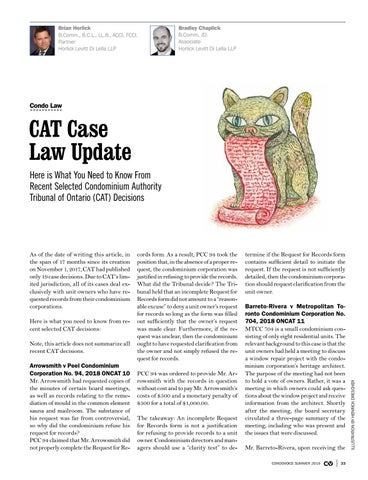Brian Horlick B.Comm., B.C.L., LL.B., ACCI, FCCI. Partner Horlick Levitt Di Lella LLP
Bradley Chaplick B.Comm, JD. Associate Horlick Levitt Di Lella LLP
Condo Law
CAT Case Law Update Here is What You Need to Know From Recent Selected Condominium Authority Tribunal of Ontario (CAT) Decisions
Here is what you need to know from recent selected CAT decisions: Note, this article does not summarize all recent CAT decisions. Arrowsmith v Peel Condominium Corporation No. 94, 2018 ONCAT 10 Mr. Arrowsmith had requested copies of the minutes of certain board meetings, as well as records relating to the remediation of mould in the common element sauna and mailroom. The substance of his request was far from controversial, so why did the condominium refuse his request for records? PCC 94 claimed that Mr. Arrowsmith did not properly complete the Request for Re-
cords form. As a result, PCC 94 took the position that, in the absence of a proper request, the condominium corporation was justified in refusing to provide the records. What did the Tribunal decide? The Tribunal held that an incomplete Request for Records form did not amount to a “reasonable excuse” to deny a unit owner’s request for records so long as the form was filled out sufficiently that the owner’s request was made clear. Furthermore, if the request was unclear, then the condominium ought to have requested clarification from the owner and not simply refused the request for records. PCC 94 was ordered to provide Mr. Arrowsmith with the records in question without cost and to pay Mr. Arrowsmith’s costs of $500 and a monetary penalty of $500 for a total of $1,000.00. The takeaway: An incomplete Request for Records form is not a justification for refusing to provide records to a unit owner. Condominium directors and managers should use a “clarity test” to de-
termine if the Request for Records form contains sufficient detail to initiate the request. If the request is not sufficiently detailed, then the condominium corporation should request clarification from the unit owner. Barreto-Rivera v Metropolitan Toronto Condominium Corporation No. 704, 2018 ONCAT 11 MTCC 704 is a small condominium consisting of only eight residential units. The relevant background to this case is that the unit owners had held a meeting to discuss a window repair project with the condominium corporation’s heritage architect. The purpose of the meeting had not been to hold a vote of owners. Rather, it was a meeting in which owners could ask questions about the window project and receive information from the architect. Shortly after the meeting, the board secretary circulated a three-page summary of the meeting, including who was present and the issues that were discussed. Mr. Barreto-Rivera, upon receiving the CONDOVOICE SUMMER 2019
CV
33
ILLUSTRATION BY HENRICK DRESCHER
As of the date of writing this article, in the span of 17 months since its creation on November 1, 2017, CAT had published only 19 case decisions. Due to CAT’s limited jurisdiction, all of its cases deal exclusively with unit owners who have requested records from their condominium corporations.
